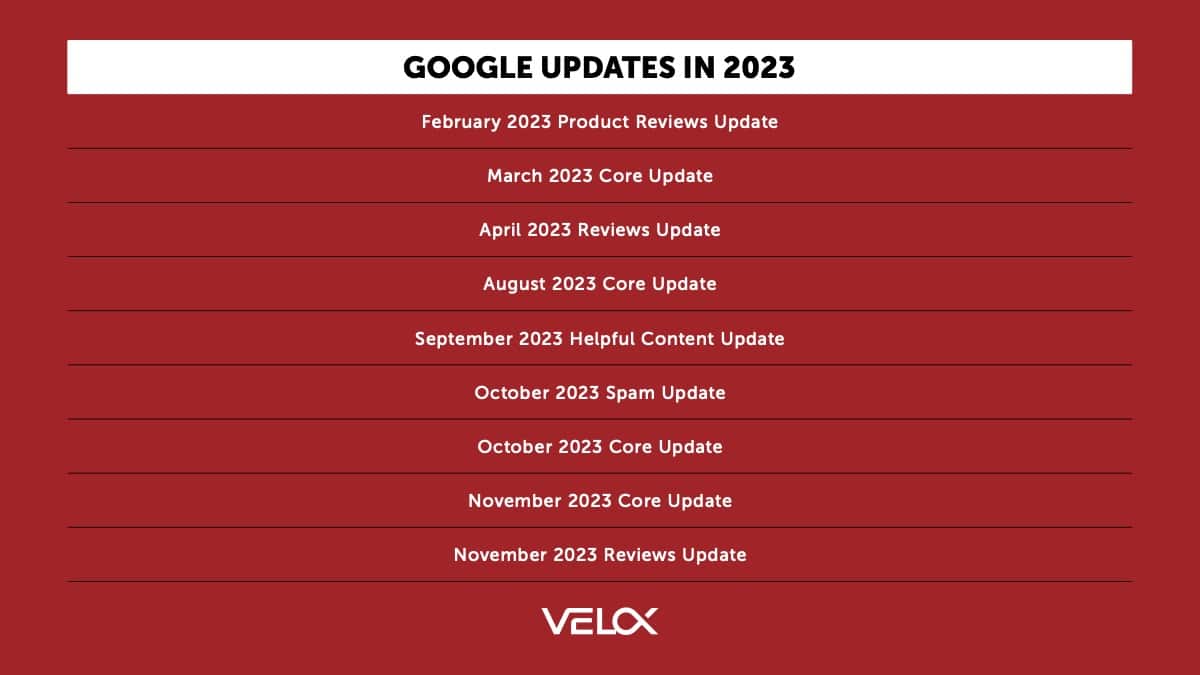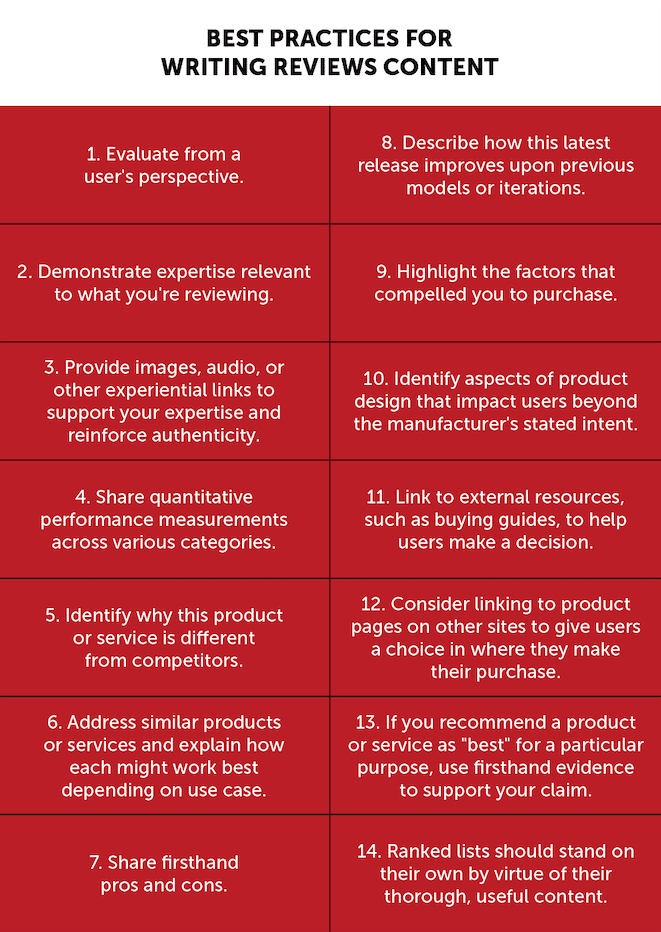
December 6, 2023
5 SEO & Digital Marketing Updates From November 2023
November marked the beginning of the holiday shopping season, the busiest time of year for digital marketers and SEOs. Along with this influx of online shoppers, November also saw significant algorithm changes and other digital marketing updates.
With Black Friday as the cherry on top of an already frantic month, you may not have had time to keep up with the latest shifts in the digital marketing landscape. That’s why we put together this list of five updates you should know heading into the final month of 2023.
From Google’s latest updates to the rapidly approaching future of search, here’s what you need to know about the latest movement in the world of SEO and digital marketing.
Google’s November 2023 Core Update
The third such update since August, Google’s November 2023 core update finished rolling out just before the end of the month.
It’s generally agreed this most recent update impacted a large number of sites based on ranking volatility and the number of SEOs bemoaning the rollout.
To be fair, the November core update dropped just a couple of weeks after a preceding core update in October, so the industry experienced quite a bit of tumult in a condensed period.

Did the latest core update impact your site? If so, Google’s boilerplate advice is to sit tight. Lower rankings don’t necessarily mean there’s something wrong with your pages—other sites might simply offer more value for searchers.
Instead of reacting to core updates and rankings fluctuations by trying to reverse-engineer them, it’s far better to stay ahead of the curve by adopting a proactive approach to SEO. This includes implementing Google’s guidance regarding helpful content, technical SEO, and other vital aspects as soon as possible.
Google Reviews Update Rollout Complete
November 8 was the last time Google would ever announce a reviews update. Not because they’re ceasing the updates but because “they will be happening at a regular and ongoing pace.”
So, rather than looking for site impacts in batches, expect these updates to occur on more of a real-time basis going forward.
If emphasizing positive reviews is a key part of your eCommerce strategy, your published review content must meet Google’s quality standards to avoid traffic decreases.
What’s a high-quality review, according to Google? Take a look at these 14 best practices and check to see whether your review content is up to snuff.

Google Teases ‘Major Changes’ to Search Rankings
While speaking at an event in early November, Danny Sullivan, Google’s Search Liaison, was quoted as saying something to the extent of “major changes” to Google’s search rankings are on the way.
This quote is certainly ominous for SEOs everywhere. But with the flurry of significant updates Google has rolled out over the past two quarters, the news shouldn’t come as much of a surprise.
Sullivan later took to X to clarify, explaining, “…I don’t want to say buckle up, because those who are making good, people-first content should be fine. But that said, there’s a lot of improvements on the way.”
There’s no word yet as to how exactly these improvements will be targeted. But we’ve already heard Sullivan say that Google will take additional action regarding issues surrounding third-party content, which could be a clue.
While it’s difficult to predict the impacts of these forthcoming changes, there’s no time like the present to take Google’s advice and enhance your site with helpful, people-first content that adheres to Google’s E-E-A-T guidelines.
Google’s Ranking Pillars Revealed in Antitrust Trial
As Google’s federal antitrust trial rolls along, the U.S. Department of Justice revealed a handful of exhibits related to search ranking.
As you can imagine, these internal emails, presentations, and other documents have captured considerable attention from SEOs looking for an edge.
In truth, there’s no single blockbuster revelation in what the DOJ has released thus far. However, these documents do provide some valuable insight into how Google ranks results—or, at least, how Google used to rank results, considering these documents are several years old.
For example, while Google’s internal claim that, “We do not understand documents. We fake it.” might raise an eyebrow, we can expect that this is no longer the case because the claim is contained in a presentation from over seven years ago. Not to mention, of course, the proliferation of AI since then.
If you want a deep dive, you can explore the ranking-related documents. For example, you might be interested to learn about Google’s 3 Pillars of Ranking:
- Body: What the document says about itself.
- Anchors: What the web says about the document.
- User Interactions: What users say about the document.
The exhibits also cover over a dozen aspects of search quality and how Google’s UX allows it to learn from past users to benefit future users.
The key takeaway? Much of what’s been made public thus far is redacted, so don’t expect to learn anything that isn’t already widely understood.
That said, if you’re looking to learn more about search rankings, these exhibits provide valuable inside perspective from the world’s search giant.
New Yahoo Search Experience to Roll Out in Early 2024
To call Yahoo an underdog when it comes to online search is like saying the New England Patriots have had better seasons—it’s a colossal, borderline criminal understatement.
But that doesn’t mean they’re out of the fight.
In Yahoo’s case, we can expect a redesigned search experience to begin rolling out in January 2024. Yahoo SVP and GM Brian Provost made the announcement at the Search Marketing Expo Next event in mid-November.
Depending on who you ask, the expectation is for the initial rollout to deliver a reskin and redesign at first, with AI-powered features and other advancements coming later on.
In January 2023, Yahoo tweeted (we’re still calling them tweets, right?) a reminder “that we did search before it was cool. BRB making it cool again.”
Microsoft’s Bing has also been taking swings this year in an effort to grow its market share. Both Bing and Yahoo are huge underdogs heading into 2024, but Google has had a rocky road as of late.
From concerns about privacy to the U.S. antitrust suit and stringent EU restrictions, Google has faced its share of challenges in the past few years, and they don’t seem to be subsiding anytime soon.
If Yahoo is serious about its new search experience, users who’ve been looking for a search engine alternative may just have something to be excited about in 2024.
Stay Ahead of the Pack with VELOX Media
It’s the busy season for digital marketers, but you can’t afford to miss important digital marketing and SEO updates that can impact your business heading into 2024.
At VELOX, we keep our finger on the pulse of this rapidly changing industry. Our PPC, SEO, and SEM experts leverage the latest technology and cutting-edge research to execute ROI-focused campaigns that surpass client expectations and drive exponential growth.
Capture the revenue your business needs to scale. Contact VELOX today to see what sustained search engine dominance can do for your bottom line.